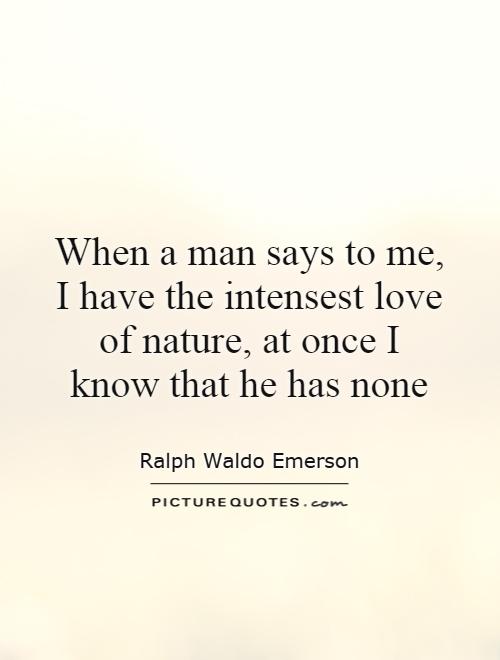When a man says to me, I have the intensest love of nature, at once I know that he has none

When a man says to me, I have the intensest love of nature, at once I know that he has none
Ralph Waldo Emerson, a prominent figure in the transcendentalist movement of the 19th century, was known for his deep connection to nature and his belief in the inherent goodness of the natural world. In his essay "Nature," Emerson explores the idea that true appreciation and understanding of nature cannot be expressed through mere words or declarations. This sentiment is reflected in his famous quote, "When a man says to me, I have the intensest love of nature, at once I know that he has none."Emerson believed that true love and appreciation of nature could not be simply stated or claimed; it had to be felt and experienced on a deeper level. He argued that those who truly loved nature did not need to boast about it or proclaim it to others. Instead, they lived their lives in harmony with the natural world, allowing its beauty and power to inspire and guide them.
For Emerson, nature was not just a source of beauty and inspiration, but also a teacher and a guide. He believed that by immersing oneself in nature and observing its rhythms and patterns, one could gain a deeper understanding of the world and their place in it. This connection to nature was not something that could be easily put into words; it was a feeling, a sense of awe and wonder that transcended language and logic.
When someone claimed to have the "intensest love of nature," Emerson was skeptical. He believed that true love of nature was not something that could be quantified or measured, but rather something that was felt deeply and profoundly. Those who truly loved nature did not need to boast about it or seek validation from others; they simply lived their lives in harmony with the natural world, allowing its beauty and power to guide them.












 Friendship Quotes
Friendship Quotes Love Quotes
Love Quotes Life Quotes
Life Quotes Funny Quotes
Funny Quotes Motivational Quotes
Motivational Quotes Inspirational Quotes
Inspirational Quotes